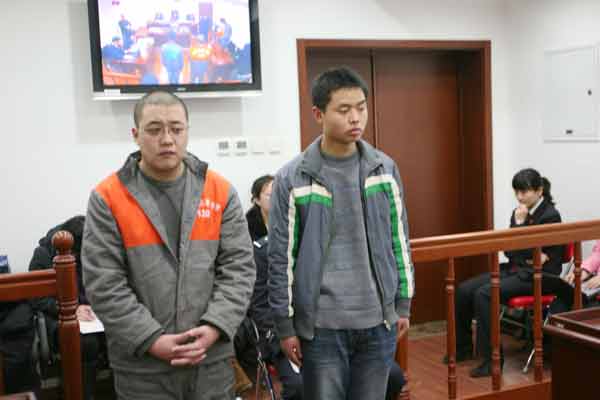Government and Policy
Human organ trafficking trial under way
By Zhang Yan (China Daily)
Updated: 2011-02-11 07:42
 |
Large Medium Small |
|

|
|
Liu Yunlu (left) and Dong Binggang appear in Beijing Xicheng District People’s Court on Thursday to answer charges in connection with their alleged involvement in the traffi cking of human organs for transplant operations. PROVIDED TO CHINA DAILY |
The pair, 31-year-old Liu Yunlu, an unemployed man from Shijiazhuang, capital of Hebei province, and 25-year-old Dong Binggang, a farmer from Shaanxi province, are charged with conducting an illegal business operation.
They were charged with that offence because there is currently no specific offence aimed at human organ traffickers, but that is expected to change in the future.
Zhang Wenxiu, a prosecutor from Xicheng procuratorate, told Xicheng District People's Court that Liu, driven by the lure of huge potential profits, became a human organ trafficker in August 2008.
Zhang said Liu recruited potential donors and matched them with people in need of transplants via an Internet instant messaging service, online forums and blogs.
The court was told that, as a broker, Liu was also responsible for forging the necessary documentation.
Zhang said Dong started out as an organ donor himself when he was in dire need of money to save his ailing mother.
She said that in January 2009, Liu arranged for Dong to have an operation at a Beijing hospital where he had a kidney removed that was sold to a patient with kidney failure.
The court heard that the patient paid them 150,000 yuan ($22,800), of which Dong got 30,000 yuan.
She said the operation cost 40,000 yuan and the rest of the money was shared between Liu and another trafficker.
The prosecutor said that during the same month, Liu brokered another trade, in Tianjin, that involved 200,000 yuan.
She told the court that Dong became an organ trafficker himself when he and Liu helped find another person willing to sell an organ to a patient who needed a liver transplant at a hospital in Changsha, capital of Hunan province.
On that occasion, 118,000 yuan allegedly changed hands.
The prosecutor told the court that the pair recruited more than 20 people who were willing to sell their organs between March and May of 2009. They found the potential donors through online postings and housed the men in two rented apartments in Shijiazhuang.
Liu insisted in court that would-be donors were well looked after.
"They lived on the floor in the apartments, and for each meal, they had meat and vegetables," he said. "I also bought four computers for them to use.
"They were free during the daytime and could wander around the residential area or stay at home to use the computers."
He said most of the men were desperately in need of money and all chose to participate and could have left at any time.
Police arrested Liu in May 2010 in the Daxing district of Beijing. Dong was arrested in the capital's Haidian district in May 2009.
The court will deliver a verdict at a later date.
The sale of human organs was banned in China in May 2007. Under the law, the only people who can donate human organs are the family members of patients. In addition, organs can be removed from suitable corpses and executed prisoners if consent forms are signed in advance.
According to statistics released by the Ministry of Health, there are 1.5 million patients in the country waiting for an organ transplant each year. Annually, there are only 10,000 such transplants.
Wang Wenkui, a judge with No 2 Criminal Court in Xicheng, told China Daily that human organ trafficking is not yet a specific offence, meaning the suspects could only be charged with conducting an illegal business operation.
Tang Hongxin, a Beijing-based criminal lawyer, said on Thursday that a more specific charge is needed.
"The charge, conducting an illegal business operation, is, to some extent, too wide to properly punish the criminals, which is a loophole in our criminal law.
"The sale of organs transgresses morality but has a profitable market in China these days," he said.
The latest draft amendment of the Criminal Law, which is now under discussion at the Standing Committee of the National People's Congress, may include a specific provision on human organ trafficking.
Cao Yin contributed to this story.
China Daily
(China Daily 02/11/2011 page3)
| 分享按钮 |